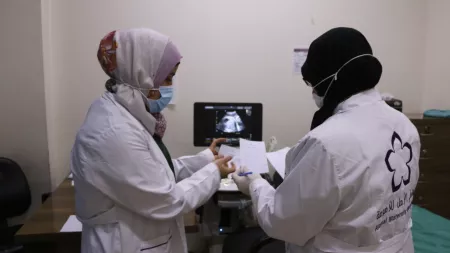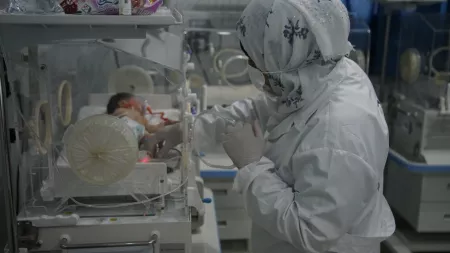Dr. Dima Um Nour is a gynaecologist at the Al-Amal Pediatrics and Maternity Hospital in A’zaz, northwest Syria. For over three years, she has supported thousands of women affected by conflict but has seen her patients' living conditions dramatically deteriorate after the February earthquakes. On World Health Day, Dr. Um Nour shares how the quakes have impacted her work and, most importantly, her patients' lives.
The workday starts at 8.30am. Every morning my patients wait in the lobby of our hospital. We receive pregnant women who come in for routine checkups, others who come in for their gynecological exams, or women who are scheduled to give birth, as well as walk-ins and emergency cases.
Every day I see 65 to 75 women. Most of them come from A’zaz city and its surrounding villages and camps. Imagine that 78% of people living in A’zaz are internally displaced people. So, most of the women, children, and newborn babies we receive here have lost their homes and stability multiple times due to the conflict and most recently also due to the earthquakes.
They may live in makeshift camps, in abandoned factories and farms or in crowded houses. Sometimes living in a house is no better than living in a tent in a camp, as in most cases, people who have accommodation usually share it with 4 or 5 families all cramped together without access to clean water, sanitation facilities, or hygiene items. In fact, no matter where you live, for most people in northwest Syria, access to clean water and hygiene items like soap and sanitary pads are a luxury. Given this grim picture, and especially after the earthquakes struck, it is no surprise that everyone is worried about the spread of cholera and other infectious diseases. This could have a life-threatening impact on pregnant women.
"The overall situation in northwest Syria was already difficult for everyone before the earthquakes, but now, everyone’s lives have just become a nightmare."
Many of my patients are really struggling to make ends meet. Often, when we prescribe medication or ask them to run a medical test, the first question we get is: “Do we really need this?” People do not have enough money to cover their medical expenses and prescriptions. The majority of our patients cannot read or write, which has many repercussions for their daily lives and activities. For example, when I ask my expecting patients to track their weight, they tell me they cannot read their weight. Most of them have never been vaccinated either.
People lost what they had managed to rebuild – their homes, their belongings and are now facing renewed displacement. We lost family members and friends. Those who have managed to find a home are now forced to live in the open and in tents again, they are exposed to extreme weather conditions, like the recent storm we experienced in the region; and access to basic everyday items and goods such as food and water is limited. Everyone was affected, without exception, what I am witnessing as a doctor after the earthquakes is something I have never seen before.
I came back to work right after the earthquakes. We immediately started receiving pregnant patients who had pre-scheduled appointments and others who came because they were now facing complications due to the shock they had undergone because of the earthquakes.
Before the earthquake, we used to have two cases of miscarriage per week at Al-Amal Hospital. Now, we see four miscarriages per day. In several cases, these are late miscarriages, which are miscarriages occurring after the 7th month of pregnancy.
I remember a case of a woman who was close to giving birth, being more than 8 months pregnant. She came for a regular check-up right after the earthquakes and during the ultrasound we found out that her baby’s heartbeat had stopped. It was one of the hardest cases. In another case, a woman who was pregnant with triplets lost all three of them. We received her a while after the earthquake, but we estimate the miscarriage took place the day of the earthquake or the following.

We also observe a devastating increase in stillbirths, witnessing 3 times more cases of stillbirths than we had seen in the past. And last but not least, we also see a very high number of premature births, with an increase of 10-12% compared to the pre-earthquake number of cases. This means that currently 3 out of 10 births at Al-Amal Hospital are premature.
Almost all women we currently have admitted into our hospital need mental health treatment and psychosocial support. Every day I refer almost all my patients to the mental health department. Some patients present more common psycho-physical symptoms, such as disruptions in their menstrual cycle, insomnia, sleep disturbances, and flare-ups of skin diseases because of stress and anxiety, but others suffer from very severe mental health conditions. There are also cases of pregnant women who are telling us they have suicidal thoughts.
The earthquakes coupled with existing unhealthy living conditions, poor sanitation or little to no access to safe drinking water and food, have all contributed to the further deterioration of the population’s health, including mental health in the northwest region. The threat of a cholera outbreak is looming, with growing numbers of suspected cases being reported daily. Thankfully, so far, the strict disinfection and sanitization measures we have in place are working but every day we pray it will stay like that.
Despite everything and against all odds, I am always trying to see the bright side of things. If the world can hear me, I urge them to continue supporting the people of Syria with medicine, medical equipment, and the tools to rebuild homes and livelihoods, as well as invest in education and support our children. They are our future.
"Every baby we take care of, and every successful delivery offers a glimmer of hope. We need to continue working and give people hope. Give them a hand to rise and rebuild their life."
Notes to editors:
This activity is funded by the German Ministry of Foreign Affairs and supported by the CARE USA Surge Fund.
* Additional information on Al-Amal Hospital, A’zaz, Aleppo: CARE covers all expenses and running costs of Al Amal hospital, including rent of the building, medical equipment and medicines costs, and staff salaries; while the hospital is run by Violet organization, CARE’s implementing partner. In February 2023 alone, the hospital provided 3,299 maternal and pediatric health services to women and children through the out-patient and in-patient departments.
The gynecology in-patient department provided medical services to 267 patients.
The total number of deliveries was 219.
The gynecology outpatient clinic provided 845 reproductive health (RH) consultations, disaggregated to 561 Antenatal Care (ANC), 12 Postnatal Care (PNC), 68 Family Planning, and 204 other reproductive health (RH) consultations.
On the other hand, the pediatric out-patient clinics provided 1,994 consultations to 981 girls and 1,013 boys and the pediatric in-patient section admitted 193 children (85 girls and 108 boys).
In addition, during the reporting month, the nutrition technician enrolled 42 new children with severe and moderate acute malnutrition signs for a complementary feeding program. Nine children suffering from complications due to SAM (Severe and Acute Malnutrition) have been admitted to the hospital. Also, the nutrition technician has provided one-to-one sessions to 120 care givers on IYCF (Infant and Young Child Feeding).
** According to UNFPA, Among the survivors of the earthquakes that claimed thousands of lives in Türkiye and Syria are around 356,000* pregnant women who urgently need access to reproductive health services. These women include 226,000 in Türkiye and 130,000 in Syria, around 38,800 of whom will deliver in the next month. Having lost loved ones, as well as their homes and all their possessions, many of these women are sheltering in informal settlements and struggling to access food or clean water, putting their health at risk.
